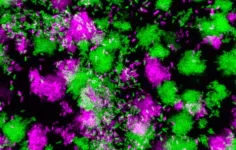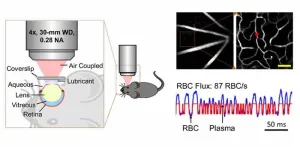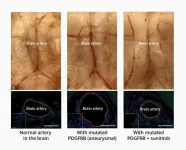(Press-News.org) Responding to rapid advances in artificial intelligence and the urgent need to define its responsible use in health and medicine, Stanford Medicine and the Stanford Institute for Human-Centered Artificial Intelligence (HAI) today announced the launch of RAISE-Health (Responsible AI for Safe and Equitable Health). This pioneering initiative seeks to address critical ethical and safety issues surrounding AI innovation and help others navigate this complex and evolving field.
Co-led by Stanford School of Medicine dean Lloyd Minor, MD, and Stanford HAI co-director and computer science professor Fei-Fei Li, PhD, the new initiative will establish a go-to platform for responsible AI in health and medicine; define a structured framework for ethical standards and safeguards; and regularly convene a diverse group of multidisciplinary innovators, experts and decision makers on the topic.
Both awareness of AI and skepticism about its use in health care have skyrocketed in the last 12 months. According to a recent Pew survey, a majority of Americans said they would be uncomfortable with their provider using AI in their own health care, underscoring the crossroads at which society finds itself.
“AI has the potential to impact every aspect of health and medicine,” Minor said. “We have to act with urgency to ensure that this technology advances in line with the interests of everyone, from the research bench to the patient bedside and beyond.”
Goals of the RAISE-Health initiative include enhancing clinical care outcomes through responsible integration of AI; accelerating research to solve the biggest challenges in health and medicine; and educating patients, care providers and researchers to navigate AI advances.
“AI is evolving at an incredible pace; so, too, must our capacity to manage, navigate and direct its path,” said Li, whose research includes a focus on ambient intelligence — using AI to monitor and respond to human activity in homes, hospitals and other environments. “Through this initiative, we are seeking to engage our students, our faculty and the broader community to help shape the future of AI, ensuring it reflects the interests of all stakeholders — patients, families and society at large.”
Building on the goals of Stanford HAI, groundbreaking Stanford faculty research and ongoing collaborations with policymakers and Silicon Valley innovators, RAISE-Health will be a trusted repository for the AI work being done at Stanford University, Stanford Medicine and well beyond — hosting standards, tools, models, data, research and best practices.
While AI offers the potential for transforming health globally, decision makers must first address AI’s safety and ethical use to responsibly harness its full potential and build public trust in these systems.
END
Stanford Medicine and Stanford Institute for Human-Centered Artificial Intelligence announce RAISE-Health, a responsible AI initiative
RAISE-Health initiative at Stanford
2023-06-14
ELSE PRESS RELEASES FROM THIS DATE:
Scientists discover small RNA that regulates bacterial infection
2023-06-14
People with weakened immune systems are at constant risk of infection. Pseudomonas aeruginosa, a common environmental bacterium, can colonize different body parts, such as the lungs, leading to persistent, chronic infections that can last a lifetime – a common occurrence in people with cystic fibrosis.
But the bacteria can sometimes change their behavior and enter the bloodstream, causing chronic localized infections to become acute and potentially fatal. Despite decades of studying the transition in lab environments, how and why the switch happens in humans has remained unknown.
However, researchers ...
Making immunotherapy safer
2023-06-14
Researchers at the University of Houston are working to make T-cell immunotherapy safer, developing a tool called CrossDome, which uses a combination of genetic and biochemical information to predict if T-cell immunotherapies might mistakenly attack healthy cells.
T-cell based immunotherapies hold tremendous potential in the fight against cancer and infectious diseases, thanks to their capacity to specifically target diseased cells, including cancer metastasis. Nevertheless, this potential has been tempered with safety concerns regarding ...
Eyeing the brain: Predicting cerebrovascular diseases with retinal imaging
2023-06-14
The brain is one of the most metabolically active organs in the human body. Although it represents only about 2 percent of the human body’s weight, it receives 15 to 20 percent of the body’s total blood supply. Disrupted blood flow to the brain over a long period of time, a condition known as “chronic cerebral hypoperfusion” (CCH), can lead to serious cerebrovascular diseases such as white matter disease.
CCH manifests as lesions in the white matter, a brain region vulnerable to problems with blood supply. Unfortunately, CCH has no available cure. An early diagnosis by visualizing the microvascular changes in the brain that occur prior to lesion ...
Phone Menu Test Detects Who May Be at Risk of Alzheimer’s Disease
2023-06-14
A new study by investigators from Mass General Brigham has found that a brief, simulated task of navigating a phone menu can detect the earliest changes in daily functioning in people at risk of developing Alzheimer’s disease. Investigators found that an older adult’s performance on the test, which can be completed in a matter of minutes, was associated with the hallmarks of Alzheimer’s disease pathology, including amyloid and tau depositions in the brain. The findings, which were published in the Journal of Alzheimer’s Disease, could help inform prevention trials testing treatments for Alzheimer’s disease before ...
When local economic inequality is high, the rich tend to be more generous
2023-06-14
Rich individuals living in communities with greater levels of economic inequality tend to be more generous with charitable giving and prosocial behaviors, according to a study published June 14, 2023 in the open-access journal PLOS ONE by Joel H. Suss from the London School of Economics & Political Science and Bank of England, UK.
Many studies have attempted to assess whether the rich are more or less generous than the poor, and whether this shifts depending on the starkness of economic inequality. Thus far, the results have been inconclusive. Previous work in this vein has been conducted at a macro level, using state, region, and country-level aggregated data. In this study, Suss ...
Ocean current comes to the rescue for Pacific island reefs
2023-06-14
Marine heatwaves are emerging as a key impact of climate change and pose a particularly significant threat to corals that form the backbone of coral reefs. Researchers have now identified a phenomenon that could help coral reef managers better plan and act for the future.[1]
Every few years, the cyclic climate pattern called El Niño arises in the tropical Pacific, causing significant changes in winds, weather and ocean temperatures. From April 2015 to May 2016, the Central Pacific witnessed one of the strongest El Niño events ever recorded.
Coral reefs were so stressed by the warmer ocean temperatures that they experienced mass bleaching, whereby the ...
'Smart' drugs can decrease productivity in people who don't have ADHD, study finds
2023-06-14
New research from the University of Cambridge and the University of Melbourne, published in Science Advances, shows neurotypical workers and students taking cognitive enhancers, or ‘smart’ drugs, may actually be inhibiting their performance and productivity.
Drugs such as methylphenidate, sold under the brand name Ritalin among others, are commonly prescribed for attention deficit hyperactivity disorder (ADHD), but are also taken by those without a diagnosis, in the belief that the drugs will enhance focus and cognitive performance.
In four double-blinded, ...
The mutant origin of brain aneurysms and the first drug treatment
2023-06-14
Researchers at the RIKEN Center for Brain Science (CBS) in Japan have discovered a set of related mutations that lead to intracranial aneurysms—weakened blood vessels in the brain that can burst at any time. The mutations all appear to act on the same biological signaling pathway, and the researchers report the first ever pharmaceutical treatment in a mouse model, which works by blocking this signal. The study was published in Science Translational Medicine on June 14.
About 5% of the population have unruptured intracranial aneurysms in blood vessels on the surface of the brain. Despite being ballooned arteries with ...
Massive hemorrhages are often deadly. Can a perfume ingredient stop the bleed and save lives?
2023-06-14
The chances of surviving massive blood loss from a traumatic injury such as a gunshot wound are around 50 percent. To survive, a patient needs two things to happen quickly: a large infusion of blood and coagulation at the wound to stop the bleeding.
The problem is one of these solutions prevents the other. Introducing a large amount of blood to those suffering a massive hemorrhage impairs the blood’s ability to clot, a condition known as coagulopathy.
Now, Tulane University researchers have uncovered the cause of coagulopathy in trauma victims receiving a blood infusion. They also found that a synthetic compound ...
Altered gut bacteria may be early sign of Alzheimer’s disease
2023-06-14
People in the earliest stage of Alzheimer’s disease — after brain changes have begun but before cognitive symptoms become apparent — harbor an assortment of bacteria in their intestines that differs from the gut bacteria of healthy people, according to a study by researchers at Washington University School of Medicine in St. Louis.
The findings, published June 14 in Science Translational Medicine, open up the possibility of analyzing the gut bacterial community to identify people at higher risk of developing dementia, and of designing microbiome-altering preventive treatments to stave off cognitive decline.
“We don’t yet know ...
LAST 30 PRESS RELEASES:
Hairdressers could be a secret weapon in tackling climate change, new research finds
Genetic risk for mental illness is far less disorder-specific than clinicians have assumed, massive Swedish study reveals
A therapeutic target that would curb the spread of coronaviruses has been identified
Modern twist on wildfire management methods found also to have a bonus feature that protects water supplies
AI enables defect-aware prediction of metal 3D-printed part quality
Miniscule fossil discovery reveals fresh clues into the evolution of the earliest-known relative of all primates
World Water Day 2026: Applied Microbiology International to hold Gender Equality and Water webinar
The unprecedented transformation in energy: The Third Energy Revolution toward carbon neutrality
Building on the far side: AI analysis suggests sturdier foundation for future lunar bases
Far-field superresolution imaging via k-space superoscillation
10 Years, 70% shift: Wastewater upgrades quietly transform river microbiomes
Why does chronic back pain make everyday sounds feel harsher? Brain imaging study points to a treatable cause
Video messaging effectiveness depends on quality of streaming experience, research shows
Introducing the “bloom” cycle, or why plants are not stupid
The Lancet Oncology: Breast cancer remains the most common cancer among women worldwide, with annual cases expected to reach over 3.5 million by 2050
Improve education and transitional support for autistic people to prevent death by suicide, say experts
GLP-1 drugs like Ozempic could cut risk of major heart complications after heart attack, study finds
Study finds Earth may have twice as many vertebrate species as previously thought
NYU Langone orthopedic surgeons present latest clinical findings and research at AAOS 2026
New journal highlights how artificial intelligence can help solve global environmental crises
Study identifies three diverging global AI pathways shaping the future of technology and governance
Machine learning advances non targeted detection of environmental pollutants
ACP advises all adults 75 or older get a protein subunit RSV vaccine
New study finds earliest evidence of big land predators hunting plant-eaters
Newer groundwater associated with higher risk of Parkinson’s disease
New study identifies growth hormone receptor as possible target to improve lung cancer treatment
Routine helps children adjust to school, but harsh parenting may undo benefits
IEEE honors Pitt’s Fang Peng with medal in power engineering
SwRI and the NPSS Consortium release new version of NPSS® software with improved functionality
Study identifies molecular cause of taste loss after COVID
[Press-News.org] Stanford Medicine and Stanford Institute for Human-Centered Artificial Intelligence announce RAISE-Health, a responsible AI initiativeRAISE-Health initiative at Stanford





